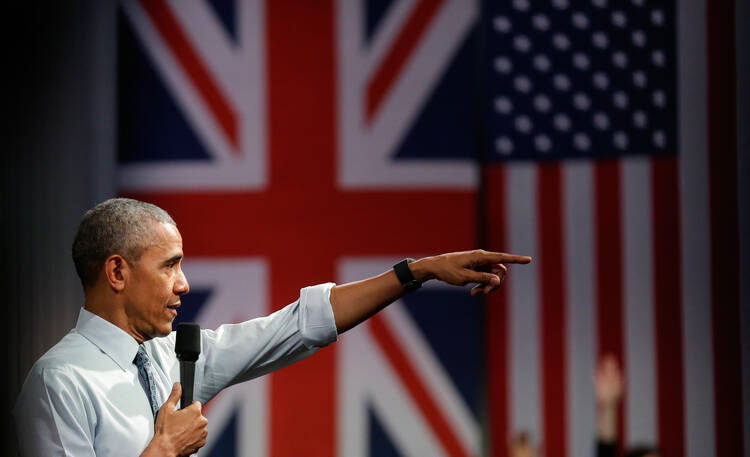Visits by foreign heads of state do not turn heads on the streets of London as they once did, probably because we are so media-saturated, security is tight and because few leaders, in this technocratic age, are endowed with all that much charisma. But President Obama just visited town, and he certainly turned heads.
He and the first lady, Michelle Obama, breezed in on Air Force One, landing at an out-of-the-way Essex airport, then continued on the Marine One helicopter straight to a large public-housing project on the other side of London, there to take tea with an elderly woman, who was marking her 90th birthday, and her eccentric, Greek-born husband. This was a kind gesture on the part of the U.S. first couple; after all, their hosts have had to live in public housing all their lives, have endured much suffering from their dysfunctional family and, totally reliant on tax-funded state handouts, were never able to hold down proper employment at any time in their lives.
Some of us here like Barack Obama quite a lot, but then again great many people in the United States, despite having figuratively hurled her predecessor into Massachusetts Bay a couple of centuries back, oddly appear to like our unelected monarch Queen Elizabeth and her family.
The Windsor Castle niceties were soon over, having softened up any Brits watching on the tellie for what was to come. The fireworks duly kicked off when the president waded into to the “Brexit” debate in such a way that it was hard to imagine that he was keeping anything back. It was a remarkable intervention on the part of the American president in the national discussion of whether or not the United Kingdom should withdraw from the European Union. Even-handedness was not on the agenda; this was a crystal-clear statement of support for “Bremain” that surpassed pro-E.U. activists’ most optimistic hopes.
The president did not have much to say about the keynote concerns of the Brexit camp—sovereignty, national identity, international influence (real or imagined) or even immigration; Obama focused on the economy, international trade and how dimly the United States would view any post-Brexit attempt by the United Kingdom to fashion a bilateral trade deal with Washington. He could not have been more blunt. He argued that the United Kingdom would be “at the back of the queue” when it came to working out new agreements. The United States, he asserted, is not now and will not be interested in individual deals but will want to collaborate with big trading blocs.
Many on the Brexit side here have been avowing that the United States would be delighted, in virtue of the so-called “special relationship,” to negotiate future deals just with Britain. President Obama crushed that fiction. “In the 21st century the nations who make their presence felt on the world stage aren’t those who go it alone,” Obama said.
The president’s speech came just a few days after the official launch of the E.U. referendum campaign. Reactions from the Brexiters were predictable, and furious. It is a referendum, not an election, but the strategists are not shying from personality politics. The “Vote Leave” side chose to lead with the figure they clearly have identified as their main vote-winner—the mayor of London and Tory leadership hopeful Boris Johnson. It is not just the improbable hairstyling of the mayor that reminds one of U.S. presidential candidate Donald Trump; Johnson’s camp has clearly decided to engage in areas of language and reference ordinarily beyond the acceptable.
Johnson turns to racist-dog whistling in a response published in a British tabloid. He suggests Obama’s intervention could be traced to a “part Kenyan” ancestry that left him with “an ancestral dislike of the British Empire.”
Obama’s use of the word queue rather than the American English line was seen by some furious Brexiters as proof that Obama’s entire intervention had been scripted by Downing Street, although one respected BBC political commentator insisted he had seen a White House aide’s expression change to horror when Obama said this. There were rumors that the president had been advised beforehand not to go this far.
Hillary Clinton has also just advised Brits not to leave. We have until June 23, when the referendum is conducted, to enjoy more of this. Obama has assuredly turned heads; he may just have turned the entire debate.
David Stewart, S.J., is America’s London correspondent.








